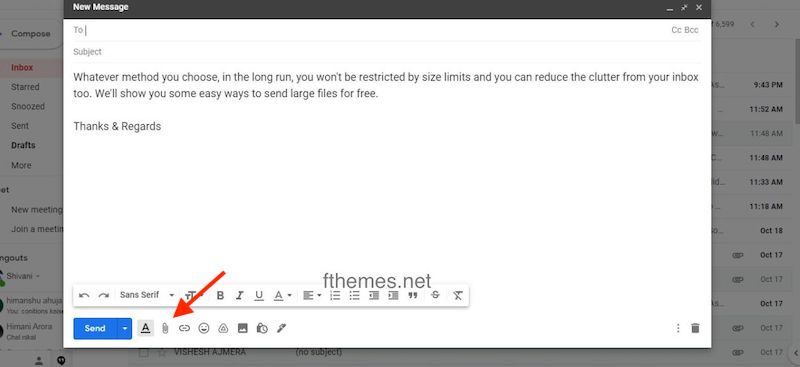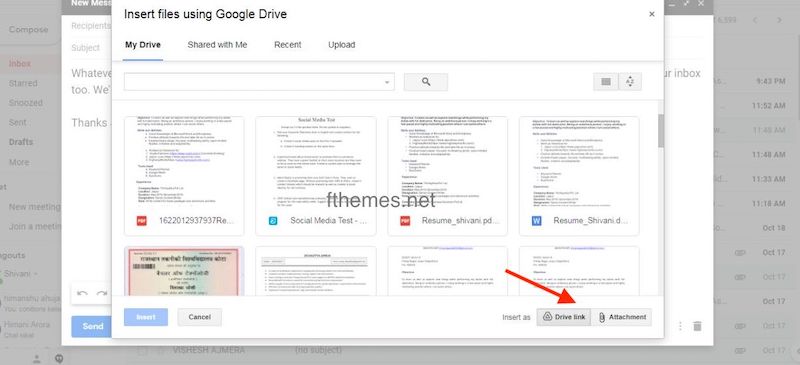How to Setup Email Sending Domain in HubSpot?
In order to send your email campaigns via HubSpot email marketing tool, you need to setup Email Sending Domain in HubSpot. Learn it here.
Our HubSpot Products
OUR COMPANY

Does this happen when you are trying to email large files then an error message pop-up on your screen "the attachment size exceeds the allowable limit"? If yes then we are here to get rid of this trouble.
Albeit, there are many ways to send large files via email, but many users don't know how to email large files.
There are size limitations to sending a file depending upon the platform you are using. The message size limitations for:
So if you are sending files in the 20+ MB range then you need to worry about seeing an error message on your screen. To avoid this message and time lost working around it there are some easy ways to send large files free.
Whatever method you choose, you won't be restricted by size limits and can reduce the clutter from your inbox too. And, you can rely on these methods for sending business emails.
Let’s get you started with sending large files via email attachments.
As the message size limitation in Gmail is up to 25MB and receive files of up to 50MB. So to email large files, use built-in Google Drive.
Here mentioned the steps to how to email large files through Google Drive:
Step 1: Open your Gmail account and click the Compose button.
Step 2: Click the Google Drive icon at the bottom of the compose window.

Step 3: The Insert files using Google Drive window appear. Just select the files you want to attach. At the bottom of the page, you will see two options- Drive Link and Attachment. Decide how you want to send your file.

Attachment only works for files that weren't built using Docs, Sheets, or Slides.
Step 4: Then click Insert.
If your recipients don't have access to the file then Gmail prompts you to change the settings of your file stored in Drive before sending the message.
If you want to send one or more files that are over 33 MB in size then Outlook will propose you upload the files to your OneDrive account. When you do this, your file gets uploaded to the OneDrive Email attachments folder. The recipient will receive a link to the file instead of the file. You can also share a file from OneDrive with a limit of 2GB.
Once the file gets uploaded, choose if people can edit the file or only view it. Select Change permissions and decide what you want to do with a file you just shared. There are two options you can choose from.
If you are using Dropbox then its Gmail Chrome extension can let you send, preview files and links without leaving your Gmail window. There is one Dropbox icon to the compose window. Click that icon and select the file from your Dropbox account. You will see that a link gets attached to the email message.
As a recipient, you get previews of all Dropbox links shared in emails. Just like attachments, you can use these links to download the files directly from Gmail or add it to your Dropbox. You get a maximum file size limit of only 2GB with a free Dropbox account.
There are multiple reasons for file transfer failure, such as your shared link having generated a large amount of traffic or exceeding the bandwidth and download limits. So for that, just check out the Dropbox bandwidth restrictions page.
Another way to email large files is the iCloud Mail Drop feature. If you are sending large files via email attachment then Mail Drop automatically pops up. So, it is better to upload the file to iCloud instead of sending the file through the Apple email server.
The attachment gets quietly auto-downloaded in the background if the recipient also has macOS 10.10. And, if you are using another email provider then the message contains an indication of the file's expiration date and a Click to the Download link,
You can send big files up to 5GB in size with Mail Drop and also mail them from the Mail app on iOS, Apple Mail, and iCloud.com on mac and PC.
People who don't want to rely on Apple, Google, and Microsoft, can transfer big files through Firefox. This browser provides you to upload and encrypt large files and share them online.
It is not mandatory to install an add-on for using Firefox. Just point out your web browser to the Firefox Send homepage and click the Select file to upload button.
After uploading the file, a link is created which you can send through email. 20 recipients can receive a link at a time. Passwords can also be set for the encrypted file.
How to email large files can also be solved by pCloud Transfer which is a part of the pCloud storage. It allows you to email large files for free without any registration. Just follow these steps:
Step 1: Go to pCloud Transfer page and an option is there of "Click here to add files", so add your files using it. You can email large files up to 5 GB and every single file should not exceed 200MB.
Step 2: Then click the "Encrypt Your Files" option and set a password.
Step 3: Your recipient will not receive any password on your behalf. At a time you can share your file with 10 recipients. Type in their email addresses in the "Send to field".
Step 4: Type an optional message and click "Send Files".
Your recipients will receive an email link after a few hours. The link remains valid for seven days. You'll get a reminder a day before the expiration date.
If you want to email large files like videos then you can easily send via the DropSend homepage without signing up.
Type the recipient's and your email address, browse to the file location, and click the Send Your File button.
Make sure that the verification procedure has been completed before sending the file. The free plan allows you a maximum file size limit of 4GB and five sends per month. The link remains valid for seven days.
Another different kind of file sharing service is SendThisFile. It sets the limits on the number of transfers you do rather than on the individual file size itself. Create a free account and click the Send Files button to start uploading files. Type in the recipient email address and click Send. The free plan lets you send files up to 2GB with unlimited file transfer.
It is always smart to rely on specialized, secure cloud storage and transfer tools whenever you want to send large files via email. The services discussed in this blog are some of the best ways on how to email large files without any issues and for basic use they are free.
And, always keep in mind that emails travel across multiple servers on their way to the recipient. An attachment you send from an email service can get rejected by another email provider.
You can reach out to our HubSpot experts to troubleshoot any particular issue you’re facing or have a custom HubSpot development requirement. If you’re having short on resources to take care of the CMS Hub configuration and other day to day HubSpot tasks, check out our HubSpot CMS management service by FThemes.
Talk soon!
TAGS
Email MarketingIn order to send your email campaigns via HubSpot email marketing tool, you need to setup Email Sending Domain in HubSpot. Learn it here.
You can rely on excel for the privacy of any file using password protect. To secure your file, you first need to know how to password protect excel.
Learn how to install HubSpot theme via .zip file or marketplace methods. The HubSpot theme installation is easy and will take 5 minutes.
Leave A Reply